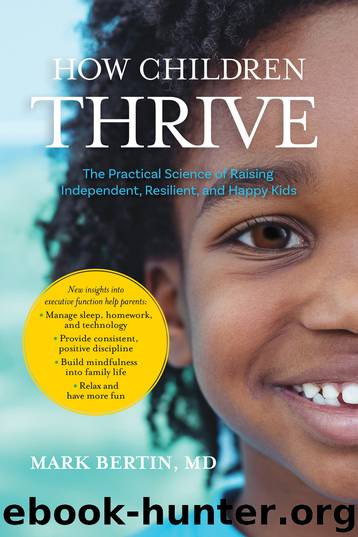How Children Thrive by Mark Bertin

Author:Mark Bertin
Language: eng
Format: epub
Publisher: Sounds True
Consider This
One challenging but straightforward way to feel less stress is to disregard the trends that have little or no substance. From overly academic preschools to radical diets to the endless marketing onslaught around “educational” products, let them go. Move beyond the message that there is yet one more thing to fear or fix and you’ll find a more stable, manageable lifestyle.
Y IS FOR WHY WE WORK HARD
Grit, Mindset, and Their Relationship to EF
YOUR CHILDREN AREN’T always going to be successful. They aren’t going to go through life without ever getting hurt, frustrated, or disappointed. They aren’t going to solve every problem on the first try and pick up every skill without effort. And that’s perfect.
In classic studies by psychologist and author Carol S. Dweck, PhD, two groups of children were presented with increasingly difficult puzzles.35 As they progressed, one group received feedback along the lines of “You’re doing great, you must be very smart.” Another group received praise targeted on effort: “You’re doing great, look how hard you’re working.” What Dr. Dweck found, and later described with the term mindset,36 is that children who are guided toward more fixed traits, like intelligence, don’t persist as long. When things get challenging, the internal message becomes, Well, I guess I’m not smart enough anymore. In the study, children not only gave up sooner but, left to play on their own, stuck with easier puzzles. Children praised for effort worked harder, and did better—they cultivated a “growth mindset.” Even during downtime, those who valued effort pushed themselves with harder puzzles.
Another psychologist and author, Angela Duckworth, PhD, has studied a related concept and calls it “grit.”37 What allows some people to persist when things get tough while others give up? Her research results are similar. When effort is emphasized, children are more likely to persist.
A fixed trait is either there or it is not; if a child fails, there is nothing in their control that they can address to improve themselves. Fixed goals are similar. If the only successful outcome is a perfect grade, winning, or being smarter than the rest, kids tend not to work as hard over time. If only straight As are okay, it’s a major failure not to get them. When we teach children to connect hard work to manageable goals, they develop the capacity and desire to sustain effort and become that much more likely to thrive.
Children are smart, so you can’t praise effort or successes that aren’t there. If you reward effort for utterly bad results, like a carelessly misspelled paper, that on its own doesn’t make someone motivated. If you award children for showing up, not actual success and work, they know the scoop. It may undermine hard work if the message becomes Whatever you do is good enough.
Interviewed in The Atlantic, Dr. Dweck herself has stated that building skills and correcting a child’s work are integral to mindset.38 It’s not about empty praise—it’s building a perspective. Praise hard work while asking for edits that push
Download
This site does not store any files on its server. We only index and link to content provided by other sites. Please contact the content providers to delete copyright contents if any and email us, we'll remove relevant links or contents immediately.
I Capture the Castle by Dodie Smith(2038)
The Heavy by Dara-Lynn Weiss(1810)
Aspergirls by Rudy Simone(1697)
Be Different by John Elder Robison(1650)
Autism's False Prophets by Paul A. Offit(1537)
My Child's Different by Elaine Halligan(1516)
Smart but Scattered—and Stalled by Richard Guare(1501)
101 Tips for the Parents of Boys with Autism by Ken Siri(1495)
Asperger Syndrome (Autism Spectrum Disorder) and Long-Term Relationships by Ashley Stanford(1426)
What's Making Our Children Sick? by Michelle Perro(1416)
ADHD by Mark Selikowitz(1393)
Girlish by Lara Lillibridge(1388)
On Immunity: An Inoculation by Biss Eula(1362)
An Adult with an Autism Diagnosis by Gillan Drew(1354)
Nerdy, Shy, and Socially Inappropriate by Cynthia Kim(1350)
Animal-assisted Interventions for Individuals with Autism by Temple Grandin(1331)
The Cities by K.A Knight(1317)
Sarah's Child (Hqn Romance) by Linda Howard(1313)
Seeing Ezra by Kerry Cohen(1306)
